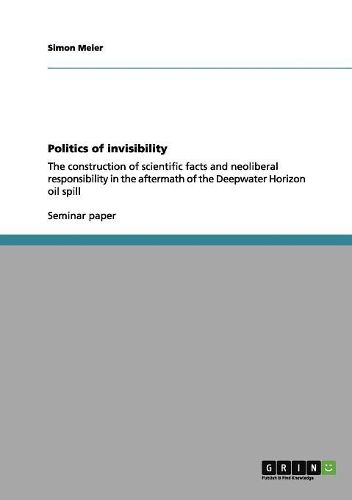Readings Newsletter
Become a Readings Member to make your shopping experience even easier.
Sign in or sign up for free!
You’re not far away from qualifying for FREE standard shipping within Australia
You’ve qualified for FREE standard shipping within Australia
The cart is loading…






Seminar paper from the year 2011 in the subject Ethnology / Cultural Anthropology, University of Zurich (Ethnologisches Seminar), course: Krisen, Konflikte, Katastrophen: Anthropologische Perspektiven, language: English, abstract: When, on the 20th of April 2010, the oil platform Deep Water Horizon was struck by a massive explosion of gas, nobody would have expected that the consequences following the event would shake national politics, damage an entire ecosystem, sicken local people and lead to a chain of further negative consequences, an opening of a Pandora’s box. In this paper I would like to investigate in the construction of scientific facts about the impacts of the spill and the distribution and allocation of responsibility. The use of massive amounts of toxic dispersants, which led the oil to disappear from the surface of the sea, in consequence also led to the slow but constant sickening of Gulf Coast residents and clean-up workers. The debate succeeding the incident is one of power, responsibility and construction of truth about the aftermath of the incident. Gulf Coast locals feel abandoned by the officials and the government. From their point of view, they don’t seem willing to acknowledge their suffering from chemical poisoning with dispersed oil and the chemical ‘Corexit’, which was used in massive amounts (ca. 6,8 million litres) by ‘British Petroleum’ (BP) to dissolve the oil in the water column. A central question of the incident and its aftermath is therefore one of responsibility in a neoliberal society with neoliberal power structures.
$9.00 standard shipping within Australia
FREE standard shipping within Australia for orders over $100.00
Express & International shipping calculated at checkout
Seminar paper from the year 2011 in the subject Ethnology / Cultural Anthropology, University of Zurich (Ethnologisches Seminar), course: Krisen, Konflikte, Katastrophen: Anthropologische Perspektiven, language: English, abstract: When, on the 20th of April 2010, the oil platform Deep Water Horizon was struck by a massive explosion of gas, nobody would have expected that the consequences following the event would shake national politics, damage an entire ecosystem, sicken local people and lead to a chain of further negative consequences, an opening of a Pandora’s box. In this paper I would like to investigate in the construction of scientific facts about the impacts of the spill and the distribution and allocation of responsibility. The use of massive amounts of toxic dispersants, which led the oil to disappear from the surface of the sea, in consequence also led to the slow but constant sickening of Gulf Coast residents and clean-up workers. The debate succeeding the incident is one of power, responsibility and construction of truth about the aftermath of the incident. Gulf Coast locals feel abandoned by the officials and the government. From their point of view, they don’t seem willing to acknowledge their suffering from chemical poisoning with dispersed oil and the chemical ‘Corexit’, which was used in massive amounts (ca. 6,8 million litres) by ‘British Petroleum’ (BP) to dissolve the oil in the water column. A central question of the incident and its aftermath is therefore one of responsibility in a neoliberal society with neoliberal power structures.